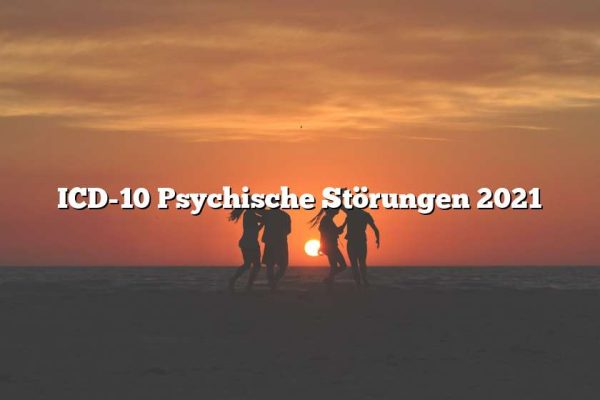With the start of a new year, mental health remains a key focus for people across the globe. As such, health care providers must stay up to date with the most recent developments and updates.
This year, the International Classification of Diseases, Tenth Edition (ICD-10) has undergone some changes in the area of mental health diagnosis. The updated ICD-10 features several new diagnoses, as well as revisions to existing ones. In this article, we explore some of the key changes to the ICD-10 Psychische Störungen 2021.
New Diagnoses
One of the most notable new additions to the ICD-10 Psychische Störungen 2021 is the inclusion of Gaming Disorder. This new diagnosis recognizes gaming addiction as a real condition, with specific diagnostic criteria. Symptoms of Gaming Disorder include a lack of control over gaming habits, prioritizing gaming over other interests and activities, and continued gaming despite negative consequences.
In addition to adding Gaming Disorder, the ICD-10 Psychische Störungen 2021 also includes several other new diagnoses, such as Compulsive Sexual Behaviour Disorder, Mixed Anxiety and Depression Disorder, and Disruptive Mood Dysregulation Disorder.
Revised Diagnoses
In addition to introducing new diagnoses, the ICD-10 Psychische Störungen 2021 also revises some existing diagnoses. One such revision is the reclassification of Gender Incongruence, which is now referred to as Gender Incongruence of Adolescence and Adulthood. This reclassification reflects a more nuanced understanding of gender identity and aims to reduce stigma surrounding the diagnosis.
Another significant revision is the expansion of the diagnosis of Burn-out. Previously, burn-out was classified as a problem related to life-management difficulty. However, the updated ICD-10 Psychische Störungen 2021 recognizes burn-out as a disorder, with three key dimensions: feelings of energy depletion or exhaustion, increased mental distance from one’s job, and reduced professional efficacy.
Conclusion
Overall, the changes to the ICD-10 Psychische Störungen 2021 reflect an evolution in the understanding and treatment of mental health conditions. The inclusion of new diagnoses and revisions to existing ones better capture the complexity of these conditions and provide necessary treatment and support options. As health care providers prioritize mental health treatment, staying up to date on the latest developments in the ICD-10 is crucial.

